Iranian Activist Given Geneva Women’s Rights Award

Iranian activist and former political prisoner Shima Babaei has been given the 2023 Geneva Summit's International Women's Rights Award.

Iranian activist and former political prisoner Shima Babaei has been given the 2023 Geneva Summit's International Women's Rights Award.
This is the third time the award has been given to an Iranian woman, after activists Masih Alinejad and Shaparak Shajarizadeh in previous years.
Presenting the 2023 award, Mayor of Frankfurt, Narges Eskandari said: "It is an honor for me to present this award to Shima Babaei, our Iranian daughter."
Then architecture student Shima became synonymous with the “Girls of Revolution Street” demonstrations held across Iran in 2017.
The women's rights activist openly defied the law requiring women to wear headscarves and stood up for political prisoners. The Iranian police repeatedly summoned, arrested, and jailed Shima.
In late 2018, Shima and her husband, fellow activist Dariush Zand, fled Iran after being charged with "assembling and colluding against national security," "propaganda against the state," and "publishing falsehoods on social media" and facing six years of imminent imprisonment.
Currently residing in Belgium, Shima continues her fight against gender discrimination.
She is now fighting for the release of her father, human rights activist Ebrahim Babaei, whose fate and whereabouts have been unknown since he was forcibly taken into custody by the Iranian authorities in December 2021.
The Geneva Summit for Human Rights and Democracy is sponsored by a coalition of 20 non-governmental organizations. Each year, on the eve of the United Nations Human Rights Council's main annual session, activists from around the world meet to raise international awareness of human rights issues.
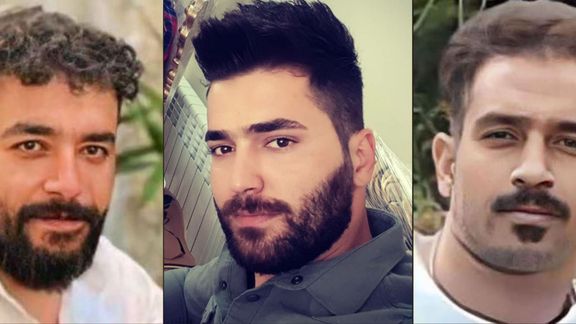
Three political prisoners on death row in Iran have written from jail urging the people to stop their execution.
Saeed Yaqoubi, Saleh Mirhashmi and Majid Kazemi, were convicted over the death of two IRGC’s Basij militia members and a police officer in protests of November last year, in what Persian media have dubbed the ‘Esfahan (Esfahan) House’ case.
Describing themselves as "children of Iran" in the letter, the three prisoners said: "Hello. We ask our dear fellow citizens not to let them kill us. We need your help. We need your support."
Amir Kazemi, Majid's cousin, verified the authenticity of the hand-written letter in an interview with Prague-based Farsi language Radiofarda.
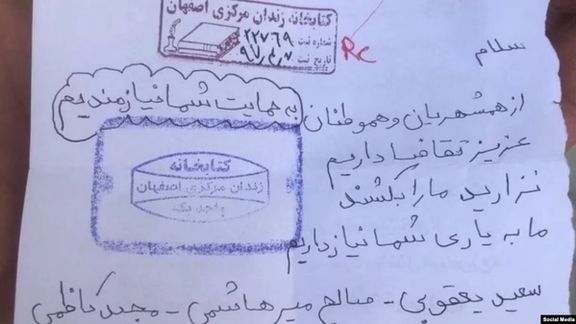
After authorities released videos of three protesters confessing to the killing of three security officers their families expressed concern about their imminent execution.
On Sunday night and again on Wednesday night, people gathered outside Esfahan (Isfahan) Central Prison hoping to stop the feared hangings.
Videos posted by activists show dozens chanting slogans in front of the prison, while gunfire was also heard as thick smoke caused by teargas enveloped the area.
Opposition activists say the death penalty is being used against the Isfahan House three as an intimidation tactic to stop further protests.
Campaigners say the prisoners were tortured into confessions, and there is no reliable evidence against them.
Earlier in the day, Diana Eltahawy, Amnesty International’s Deputy Director for the Middle East and North Africa, called on the international community to take bold action to prevent the execution of the three protesters who were tortured into confessing.
“The shocking manner in which the trial and sentencing of these protesters was fast-tracked through Iran’s judicial system amid the use of torture-tainted ‘confessions’, serious procedural flaws and a lack of evidence is another example of the Iranian authorities’ brazen disregard for the rights to life and fair trial,” she said.
Majid Kazemi said in an audio recording from prison that he was forced to make false self-incriminating statements after interrogators beat him, gave him electric shocks, subjected him to mock executions, and threatened to rape him, execute his brothers and harass his parents.
Iranian expatriate communities plan demonstrations against the executions in cities worldwide on Saturday, May 20.
In a separate development, Iran International has learned that hearings were held for seven people detained during the ‘Women, Life, Liberty’ protests at the Revolutionary and Criminal Courts of Tabriz in the past few days. They were arrested in the city in September and November last year during protests following the death in custody of 22-year-old Mahsa Amini.
The seven -- identified as Pejman Eslami (31), Baqer Taji Ahmadifard (35), Mehdi (Safa) Fanai(41), Alireza Shirdel(33), Amir Ahmadian (21), Anoush Adami (34) and Omid Abdollah-Beigi (35) -- were charged with various crimes such as ‘Moharebeh’ that can lead to a death sentence.
Moharebeh (also transliterated as muharebeh) is an Islamic-Arabic term that in the lexicon of the Iranian regime means "fighting God” or “war against God,” and carries the death penalty. “Corruption on earth” is also another term that carries the death penalty.
According to unconfirmed reports, at least 10 underage protesters are also facing death sentences for the “moharebeh” and “corruption on earth”.
Nationwide protests that erupted after the death of Kurdish Iranian Mahsa Amini on September 16, posed the biggest internal challenge to the Islamic Republic since its establishment in 1979. So far, around 500 civilians have been killed by security forces and at least 20,000 arrested. While many have been released, around 1,500 face criminal charges, and at least 80 detainees face the death sentence.

The Biden administration has proposed to Israel to start “Joint military planning” regarding Iran, Walla news website reported Wednesday.
Quoting three US and Israeli officials, the website said that a few weeks ago the United States proposed the joint effort, but it is not clear whether it pertains only to exchange of information and planning or it also means joint military action.
Israel has not rejected the offer but views the proposal with suspicion as it could be designed to “tie Israel’s hands” in any contingency to attack Iran, in particular its nuclear installations. Israel has reportedly asked Washington for clarifications.
Israeli leaders have repeatedly said that they will not tolerate a nuclear Iran and would take military action to stop it.
The report quoted American officials as saying that there was no hidden agenda in the proposal and Washington simply wanted to give reassurances to Israel regarding the US commitment to security relations.
The Biden administration has also said in recent months that all options are on the table and conducted large military drills with the Israeli Defense Forces in January.
Walla quoted senior US officials as saying that the proposal was made during visits to Israel by the Chief of the Joint Staff, General Mark Milley and US defense secretary Lloyd Austin in early March, as well as by Gen. Eric Korilla, commander of CENTCOM.
The American sources who spoke to Walla said “joint military planning” means that each side will share its plans for various scenarios.

The Islamic Republic’s Revolutionary Guards (IRGC) have made a criminal Iran’s leading drug lord, Iran International can reveal.
Information obtained by Iran International shows how Naji Sharifi-Zindashti and his cartel now dominate the narcotics trade thanks to the support of the government militia.
His extraordinary rise comes despite his having killed a prison guard in Iran and fleeing abroad, only to return with impunity.
Investigative reporter Mojtaba Pourmohsen has uncovered how a recent rise in the number of executions of convicts sentenced to death on drug-related charges is the result of infighting between rival drug cartels with connections within the ranks of the IRGC.
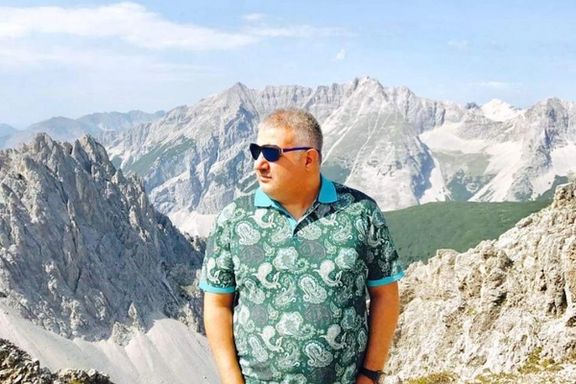
Emerging triumphant from this criminal war, Sharifi-Zindashti and his accomplices – dubbed “The Friends’ Club” – have used the IRGC’s vast reach and control over transit routes and logistics to gain the upper hand in Iran's drug market, according to sources.
The Club comprises senior IRGC officials and high-ranking members of Iran’s Supreme National Security Council as well as managers from Tehran Municipality and members of parliament.
Sharifi-Zindashti not only pays bribes but also supplies opium and heroin for the personal consumption of many of these senior officials.
According to the sources, Sharifi-Zindashti’s gangs traffic more than 20 percent of drugs distributed across Iran and about 35 percent of the drugs pushed in the capital Tehran.
The narcotics that are confiscated and destroyed as part of the Islamic Republic’s regular war on drugs mostly belong to rival gangs.
Iranian police arrested Zindashti in 1996 for a drug deal. Sentenced to death on drug-related charges, Zindashti along with an accomplice killed a guard during transfer to the court to testify in another case. Zindashti fled to Turkey, where he established a drug and human trafficking cartel.
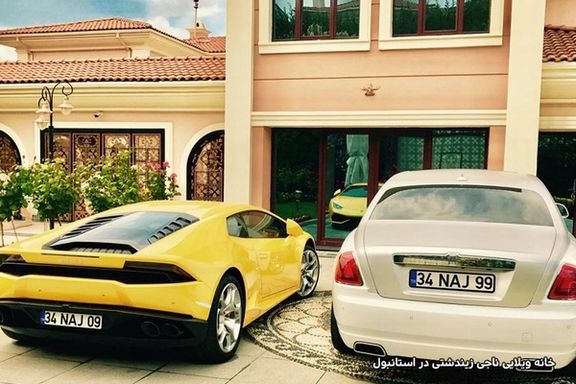
He has since been cooperating with the Islamic Republic’s intelligence agencies in numerous cases, including the abduction in 2020 of Swedish-Iranian Habib Chaab (Asyud), a political activist and former leader of the Arab Struggle Movement for the Liberation of Ahwaz (ASMLA) who was executed earlier in the month.
In December 2020, the Turkish Police arrested 13 members of the Zindashti Cartel on charges of collaboration with Iranian intelligence. According to Turkey's official government news agency, Anatoli, the Iranian Intelligence Ministry had been using the gang to assassinate or abduct Iranian dissidents in Turkey at least since 2015.
Zindashti is also suspected to have been behind the assassination of Iranian dissident Masoud Molavi Vardanjani in Istanbul in November 2019. Molavi-Vardanjani, a former Iranian intelligence operative and a civil engineer by education, fled to Turkey in 2018 and launched a Telegram channel, called Black Box, focused on corruption allegations against Iran’s extraterritorial Qods Force, top officials in the office of Supreme Leader Ali Khamenei, judges and other senior figures.
In 2018 some of the members of the group and Zindashti himself were arrested in Turkey on suspicion of assassinating Saeed Karimian, the founder and head of Gem TV, and other killings related to drug trafficking. They were eventually freed, reportedly as a result of lobbying, bribery and lack of adequate evidence.
After his release Zindashti returned to Iran and despite his convictions for drug trafficking and the killing of a prison guard in the past, Zindashti leads a free life in Iran. In December 2022, he was honored during a ceremony by Iran’s Education Ministry as one of the members of the Charity for School Constructions. He is a benefactor and CEO of Zindashti Star Charitable Institute, constructing shopping malls and schools, yet also a drug lord with links to regime insiders.

A $10 billion project has been agreed to develop a vast natural gas field shared between Qatar and Iran.
The deal was signed by QatarEnergy with French-owned Technip Energies for the scheme in the world’s largest natural gas field.
The Iranian part, known as South Pars, supplies 70% of Iran's gas.
In a statement on Tuesday, QatarEnergy stated that the project will include two giant liquefied natural gas (LNG) production lines, with an annual capacity of 16 million tons.
The company said the extra LNG capacity would increase the country's total production by 60 percent reaching 126 million tons by 2027.
The Russian war on Ukraine and sanctions imposed by Europe and the US on Moscow have increased global demand for Qatar's gas.
The rapid development of the Qatari part comes as the completion of the remaining phases of the Iranian part has been delayed for years.
Just to maintain current production, Iran needs to invest up to $50 billion in its gas fields, especially in the Persian Gulf offshore South Pars reserves shared with Qatar.
In Iran’s gas fields, as any other in the world, underground pressure that pushes the gas out declines over time, so necessitating modern technology to maintain production level. However, such equipment is only provided by a handful of Western energy giants and the sanctions against Iran are a barrier for them to invest.
Although Iran has the second-largest natural gas reserves in the world, holding more than 17 percent of global fields, the government has issued warnings of power cuts in winter, as power plants that lacked sufficient gas supplies were forced to switch to less efficient liquid fuels.
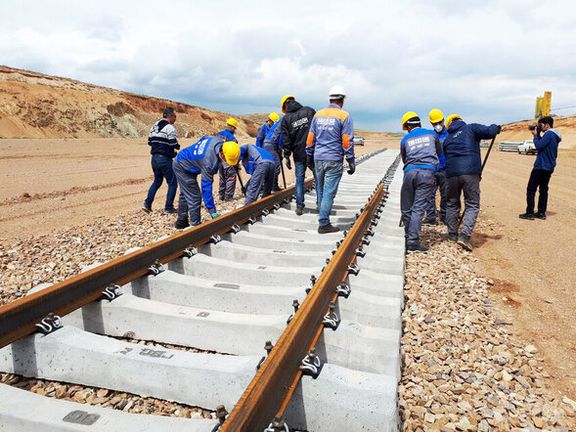
Russia and Iran have agreed a deal to finance and build a railway providing a strategically significant new link in the region.
The Rasht-Astara link is seen as an important link in the corridor that will connect India, Iran, Russia, Azerbaijan, and other countries by rail and by sea.
The 162 km railway along the Caspian Sea coast will go from Russian ports on the Baltic Sea to Iranian ports on the Indian Ocean and Gulf of Aden.
Wednesday’s deal was signed by Russian President Vladimir Putin and his Iranian counterpart Ebrhaim Raisi in a meeting on video link.
Putin said: "The unique North-South transport artery, of which the Rasht-Astara railway will become a part, will help to significantly diversify global traffic flows."
He claimed the “successful cooperation within the framework of this ambitious project is evidence of the high standards and the fruitful and mutually beneficial nature of Russia-Iran relations.”
Both Russia and Iran are giving priority attention to the strengthening of trade, economic and other bilateral ties, which are based on the principles of neighborliness, mutual respect and consideration for each other’s interests, said Putin.
Raisi said: "Without a doubt, this agreement is an important and strategic step in the direction of cooperation between Tehran and Moscow."
It comes as Western sanctions bite hard against Russia following its invasion of Ukraine and against Iran over its nuclear programme. The two ostracised nations are increasingly cooperating, with Iran providing drones and other weapons for Russia as its fights in Ukraine.
The North-South route was originally signed by Russia, Iran, and India in the early 2000s, and since then other countries have ratified it, including Azerbaijan, Belarus, Bulgaria, India, Iran, Kazakhstan, Kyrgyzstan, Oman, Russia, Tajikistan, Turkey, and Ukraine.